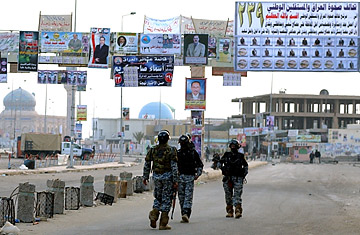
Iraqi soldiers patrol the streets in the western Anbar town of Ramadi.
Any Minnesota voter could tell you that disputed election results are hardly uncommon in a democracy, but a contested outcome takes on a different complexion in an Iraq still haunted by the specter of communal violence. And that's exactly what has Mohammed Mahmood Nutah worried. Nutah is a senior official in the Anbar Salvation Council, one of three Sunni parties vying for control of Anbar in provincial elections. The dispute brewing over the close election tally in the province could erupt in violence, Nutah warns. "I can assure you that the people of Anbar are just like a volcano now. We are sitting on top of it to prevent an eruption."
Warnings of violence in Anbar province have amplified in recent days, as Iraqi election officials slowly tally ballots from Saturday's vote. Preliminary results are expected Thursday, but tribal leaders from Anbar — who, under the rubric of the Anbar Awakening, cooperated with the U.S. to drive out al-Qaeda in 2007 — say the local vote was rigged by the Iraqi Islamic Party, which currently holds the governorship. (See pictures of normalcy returning to Iraq's streets.)
Salvation Council officials say their projections from monitors at polling stations show the party running neck and neck for provincial council seats with candidates backed by the Awakening. The Salvation Council is actually an offshoot of the Awakening movement, and rivalry between the two groups is muted. But both groups scorn the Iraqi Islamic Party (IIP), accusing it of being in political front for al-Qaeda in Mesopotamia — a link denied by the IIP. Nutah said his party's initial tallies showed that Iraqi Islamic Party did not have enough supporters to gain even a single seat in Anbar's provincial council, which selects the regional governor. And both the Awakening and the Salvation Council charge that rather than accept defeat, the IIP has been stuffing ballot boxes in Anbar province. The IIP denies the accusation.
The Anbar Salvation Council has filed a formal complaint with the Independent High Electoral Commission of Iraq, but Nutah and other party members warn that if Thursday's initial result gives what they see as an improbable victory to the IIP, the dispute is likely to turn nasty. "If the results show that the Islamic Party has gotten the most votes, it will be a disaster," said Nutah, who spoke to TIME at the council's Baghdad headquarters. "If the results don't reflect what the people want, we cannot control the streets of Anbar."
The fighting tribesmen of the Salvation Council and the Awakening movement have a proven ability to shape the province's destiny through the barrel of a gun. Anbar had seen some of the most intense violence of the war, before a crucial turning point in which the tribal sheiks who had been fighting on the side of the insurgency rebelled against al-Qaeda in Mesopotamia, and waged a brutal campaign to rout jihadists in the province with backing from the U.S. military. Many of those same tribal leaders believe they, not the IIP, are the rightful power in the vast sandy province in Western Iraq, and once they had ousted al-Qaeda, many were ready to dismantle the local power of the IIP by force. U.S. officials counseled patience, urging them to take power by legitimate means in the provincial elections. The IIP had only won control of Anbar because most Sunnis in Anbar boycotted the 2005 provincial elections.
Still, for now all parties to the Anbar dispute are waiting for the verdict of the Independent High Electoral Commission of Iraq, which has called for patience as their workers sift through roughly 7.5 million ballots. "Of course any political entity has the right to complain," said Qassim al-Abodi, the chief electoral official for the independent commission overseeing the vote. On Sunday, Al-Abodi stressed that no serious irregularities had occurred, despite a number of initial complaints. And he warned against efforts to discredit or reject election results in light of the extrodinary efforts undertaken to ensure proper procedures. "There is a difference between complaining and distorting the facts."
Still, it remains to be seen whether the tribal sheiks who went to war to suppress the insurgency in Anbar to reassert their traditional authority will be willing to accept an election result that goes against them. And if they don't, Anbar could once again become a security hot-spot — despite its largely homogenous Sunni population and the defeat of the insurgency in the province.
